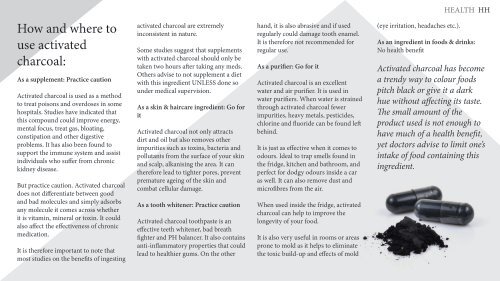Create successful ePaper yourself
Turn your PDF publications into a flip-book with our unique Google optimized e-Paper software.
HEALTH HH<br />
How and where to<br />
use activated<br />
charcoal:<br />
As a supplement: Practice caution<br />
Activated charcoal is used as a method<br />
to treat poisons and overdoses in some<br />
hospitals. Studies have indicated that<br />
this compound could improve energy,<br />
mental focus, treat gas, bloating,<br />
constipation and other digestive<br />
problems. It has also been found to<br />
support the immune system and assist<br />
individuals who suffer from chronic<br />
kidney disease.<br />
But practice caution. Activated charcoal<br />
does not differentiate between good<br />
and bad molecules and simply adsorbs<br />
any molecule it comes across whether<br />
it is vitamin, mineral or toxin. It could<br />
also affect the effectiveness of chronic<br />
medication.<br />
It is therefore important to note that<br />
most studies on the benefits of ingesting<br />
activated charcoal are extremely<br />
inconsistent in nature.<br />
Some studies suggest that supplements<br />
with activated charcoal should only be<br />
taken two hours after taking any meds.<br />
Others advise to not supplement a diet<br />
with this ingredient UNLESS done so<br />
under medical supervision.<br />
As a skin & haircare ingredient: Go for<br />
it<br />
Activated charcoal not only attracts<br />
dirt and oil but also removes other<br />
impurities such as toxins, bacteria and<br />
pollutants from the surface of your skin<br />
and scalp, alkanising the area. It can<br />
therefore lead to tighter pores, prevent<br />
premature ageing of the skin and<br />
combat cellular damage.<br />
As a tooth whitener: Practice caution<br />
Activated charcoal toothpaste is an<br />
effective teeth whitener, bad breath<br />
fighter and PH balancer. It also contains<br />
anti-inflammatory properties that could<br />
lead to healthier gums. On the other<br />
hand, it is also abrasive and if used<br />
regularly could damage tooth enamel.<br />
It is therefore not recommended for<br />
regular use.<br />
As a purifier: Go for it<br />
Activated charcoal is an excellent<br />
water and air purifier. It is used in<br />
water purifiers. When water is strained<br />
through activated charcoal fewer<br />
impurities, heavy metals, pesticides,<br />
chlorine and fluoride can be found left<br />
behind.<br />
It is just as effective when it comes to<br />
odours. Ideal to trap smells found in<br />
the fridge, kitchen and bathroom, and<br />
perfect for dodgy odours inside a car<br />
as well. It can also remove dust and<br />
microfibres from the air.<br />
When used inside the fridge, activated<br />
charcoal can help to improve the<br />
longevity of your food.<br />
It is also very useful in rooms or areas<br />
prone to mold as it helps to eliminate<br />
the toxic build-up and effects of mold<br />
(eye irritation, headaches etc.).<br />
As an ingredient in foods & drinks:<br />
No health benefit<br />
Activated charcoal has become<br />
a trendy way to colour foods<br />
pitch black or give it a dark<br />
hue without affecting its taste.<br />
The small amount of the<br />
product used is not enough to<br />
have much of a health benefit,<br />
yet doctors advise to limit one’s<br />
intake of food containing this<br />
ingredient.<br />
Issue 6 | <strong>2018</strong> | <strong>Heritage</strong> <strong>Hill</strong> Estate 47
















